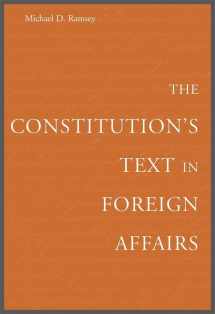
The Constitution’s Text in Foreign Affairs
ISBN-13:
9780674024908
ISBN-10:
0674024907
Author:
Michael D. Ramsey
Publication date:
2007
Publisher:
Harvard University Press
Format:
Hardcover
504 pages
Category:
General
,
Constitutional Law
FREE US shipping
Book details
ISBN-13:
9780674024908
ISBN-10:
0674024907
Author:
Michael D. Ramsey
Publication date:
2007
Publisher:
Harvard University Press
Format:
Hardcover
504 pages
Category:
General
,
Constitutional Law
Summary
The Constitution’s Text in Foreign Affairs (ISBN-13: 9780674024908 and ISBN-10: 0674024907), written by authors
Michael D. Ramsey, was published by Harvard University Press in 2007.
With an overall rating of 3.5 stars, it's a notable title among other
General
(Constitutional Law) books. You can easily purchase or rent The Constitution’s Text in Foreign Affairs (Hardcover) from BooksRun,
along with many other new and used
General
books
and textbooks.
And, if you're looking to sell your copy, our current buyback offer is $0.56.
Description
This book describes the constitutional law of foreign affairs, derived from the historical understanding of the Constitution's text. It examines timeless and recurring foreign affairs controversies--such as the role of the president and Congress, the power to enter armed conflict, and the power to make and break treaties--and shows how the words, structure, and context of the Constitution can resolve pivotal court cases and leading modern disputes. The book provides a counterpoint to much conventional discussion of constitutional foreign affairs law, which tends to assume that the Constitution's text and history cannot give much guidance, and which rests many of its arguments upon modern practice and policy considerations. Using a close focus on the text and a wide array of historical sources, Michael Ramsey argues that the Constitution's original design gives the president substantial independent powers in foreign affairs. But, contrary to what many presidents and presidential advisors contend, these powers are balanced by the independent powers given to Congress, the Senate, the states, and the courts. The Constitution, Ramsey concludes, does not make any branch of government the ultimate decision maker in foreign affairs, but rather divides authority among multiple independent power centers.


We would LOVE it if you could help us and other readers by reviewing the book
Book review

Congratulations! We have received your book review.
{user}
{createdAt}
by {truncated_author}


